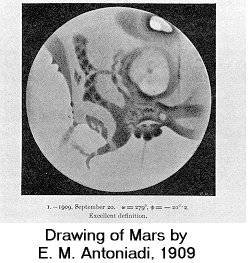Flammarion (February 26, 1842 – June 3, 1925) was a French astronomer and a prolific author of more than fifty titles, including popular science works about astronomy, several notable early science fiction novels and works on psychical research and related topics. He also published the magazine L'Astronomie, starting in 1882 and maintained a private observatory at Juvisy-sur-Orge, France.
Antoniadi became a highly reputed observer of Mars and at first supported the notion of Martian canals, but after using the telescope at Meudon Observatory during the 1909 opposition of Mars, he came to the conclusion that canals were an optical illusion. He also observed Venus and Mercury and made the first attempts to draw a map of Mercury, but his maps were flawed by his incorrect assumption that Mercury had synchronous rotation with the Sun. The first standard nomenclature for Martian albedo features (an albedo feature is a large area on the surface of a planet which shows a contrast in brightness or darkness of adjacent areas) was introduced by the International Astronomical Union when they adopted 128 names from the 1929 map of Antoniadi.
Craters on Mars and on the Moon were named in his honor, as well as Antoniadi Dorsum on Mercury. He is also famed for creating the Antoniadi scale of seeing (a five-point system when observing celestial bodies, with 1 being the best seeing conditions and 5 being the worst) that is used by amateur astronomers.
He was also a strong chess player. Antoniadi was taught chess by his brothers while very young and began studying theory from Staunton's Handbook in 1888 and later on he subjected the games of Morphy to close study. While still living in Constantinople he took part in four private tournaments where the city's strongest players participated, winning all four.
In 1893 he went to France and although he lost most of his games against Janowsky, he did manage several wins. Ten years later he began to study the games played at the Hastings tournaments after having been motivated by the writings of Tarrasch, whose games he also studied.
When studying the games, he tried to following them without moving the pieces and it paid off because his judgment increased to the point that he was able to beat all the amateurs in Paris. He had also hoped to play Janowsky again as well as Taubenhaus but was unable to meet them.
In 1905 he tied for first with a French player named Clerissy and a strong English amateur named J.M. Lee in the Cafe de la Regence Championship with a score of 12-2. His best performance was in Paris 1907 where he tied for first with Marshall whom he beat and ahead of Tartakower, whom he also beat. His only loss was to de Villeneuve. In that game he had a winning position in which he had two passed Ps and was up the exchange. It was claimed he lost unexpectedly due to the fact he was sick. Marshall won the playoff.
Antoniadi attributed his success entirely to his studies of Tarrasch's works and he considered Morphy to have been the greatest player of all time and felt Morphy would easily defeat any of the modern players. His opinion of the the "Modern" school headed up by Steinitz was that it was a synonym for "lack of genius."
Paris 1907
1) Eugene Antoniadi and Frank Marshall 6.0
3) Savielly Tartakower 5.0
4) Jean de Villeneuve 4.0
5-6) Gustave Lazard and C. W. Pape 2.0
7-8) Hagen and H. Weinstein 1.5
Frank Marshall 1 ½ ½ 2.0
Eugene Antoniadi 0 ½ ½ 1.0



No comments:
Post a Comment